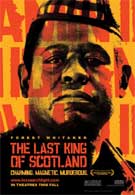Lately whenever there’s a major disaster in the United States that claims the lives of thousands of people, Hollywood can hardly wait until enough time has passed so that they can make a movie about it without offending anyone. How many 9/11 movies have we had now? However, when hundreds of thousands of people in another country are brutally murdered by their own government, the cinema industry waits until the idea is trendy enough to really tackle the topic. Too late they come to that table, but perhaps not in futility.
Hotel Rwanda broke the ice in 2004 with its devastating look at the 1994 Rwandan genocides. Thanks to the well-deserved critical acclaim and numerous awards that movie received, suddenly Africa is a hot spot for travesty films. The Last King of Scotland, the story of Ugandan President Idi Amin, is the next to hop on the bandwagon (others joining the fray this year are Leonardo DiCaprio’s Blood Diamond and Tim Robbins’ Catch A Fire).
Where Hotel Rwanda seemed highly biographical and strove to stick to the facts as much as possible, The Last King of Scotland takes a much more theatrical approach. It sets forth by heightening the drama and turning the adrenaline up a notch, even creating a completely fictional character through whom the audience sees and experiences the story. Whether or not you find that tack patronizing, there’s no doubt that the movie is genuine in its intent, emotionally wrenching to the very last second, and not afraid to display the brutalities of Amin’s regime and the circumstances behind them.
It’s the 1970s and Nicholas Garrigan (James McAvoy) is a brash and dashing young Scotsman with a heart for adventure and a gift for seducing other men’s wives. Fresh out of medical school, he decides not to follow in the footsteps of this father, a quiet family practice doc, and instead sets off to Uganda to practice rural medicine and seek his fortune. About the time Nicholas arrives in the country, a military general and hero to the people is setting about the business of liberating the Ugandan nation from a corrupt president. That general, Idi Amin (Forest Whitaker), a common man who rose through the ranks from the poorest of origins, is put into the Presidency to the cheers of his people.
Through a series of fortuitous events, Nicholas finds himself in the favor of Amin, and leaves his post at a rural clinic to accept an invitation to serve as the president’s personal physician and the nation’s chief medical officer. At first, Nicholas is swept up by the same enthusiastic and patriotic spirit that has won Amin the hearts and minds of his people. As time goes on the cracks in Amin’s veneer begin to show and Nicholas plays witness to the depths of the leader’s mental instability and paranoid ravings. In time he begins to see the chaos and destruction Amin is unleashing on his own people and realizes how blind he has allowed himself to become to the travesties going on around him.
There’s plenty of truth to the events surrounding Garrigan’s interactions with Amin, but the nature of his perspective is not intended for historical accuracy. His experience seems designed to point out the flaws in the way the outside world sees Africa. It’s a place the “white man” goes to seek adventure, ignoring its realities and tragedies until it’s too late. McAvoy captures the spirit of that perspective flawlessly with a powerful performance, shadowed only by Whitaker’s striking embodiment of Idi Amin.
Whitaker, who is better known for his subtle skills as a character actor, explodes onto the screen with a powerful energy that drives the film and doesn’t stop for a single frame. Everything from the broad strokes to the nuances of his leading performance create an amazing picture of a man who began with the best of intentions but descended to unimaginable depths under the weight of a pressure that was too much to bear. In the span of less than two hours, Whitaker succeeds in taking you from wanting to hug and cheer for Amin, to despising him for his atrocious and unspeakable acts against innocent people.
Your Daily Blend of Entertainment News
Director Kevin McDonald adds an extra dimension with the story he tells through the camera lens. He’s unafraid to show you everything you need to see, no matter how graphic, to understand the magnitude of any situation and he manages it without becoming gratuitous or unauthentic. While he exhibits an occasional flair for the dramatic with stylized elements scattered throughout, he remains true to the story and the actors working so hard to tell it. His brilliant supporting cast, which includes Gillian Anderson and Simon McBurney, are no less effective in their roles, even if their screen time is all too brief.
Does The Last King of Scotland have a message for the world? All too clearly it does, and it's brilliantly but subtly offered. Will the audience hear it? That’s hard to say. When the biographical facts of Amin’s final days as president in 1979 flash across the screen, including the 300,000 Ugandan body count he produced while in office, the audiences quietly gasps in horror and shakes their head in disbelief. But will they grasp that there’s more to the story than just a sad history lesson? It’s in there for those who will pay attention. For the rest, this is just another rendition of a dictator’s story of whose telling comes thirty years too late.

